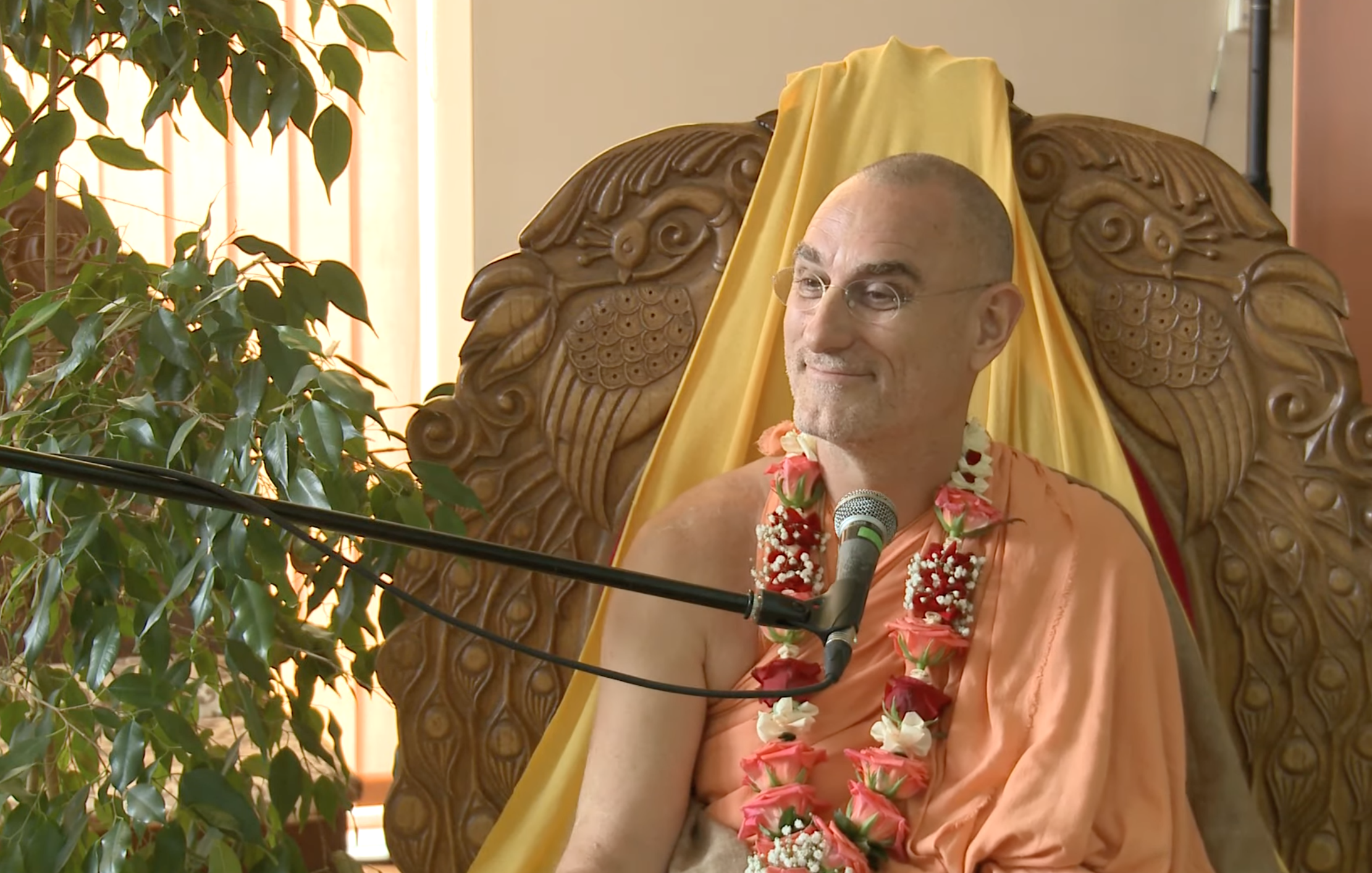
Prabhu: There is a conflict in my mind because you said we should see Kṛṣṇa in everything, but in the beginning of my Kṛṣṇa consciousness I got the instruction that I should see all my possessions, everything, as the property of Guru. Actually, I should give everything to Guru. So I have a conflict with these two instructions, these two points of knowledge.
His Holiness Bhaktividyā Pūrṇa Svāmī Mahārāja: Sākṣād-dharitvena samasta-śāstrair [Gurvāṣṭakam 7] So there is no difference, if it is given to Guru or given to Kṛṣṇa, it is the same thing. Without Guru, you can't see Kṛṣṇa, does that make sense? So there is no difference. It means, you see it in relation to Kṛṣṇa. So you don't see the Guru in relation to Kṛṣṇa? So this is the important element. See, the neophyte has a tendency to see... Means, seeing Kṛṣṇa, that's fine, but then seeing that Guru is... Unfortunately the Guru is THE only way. So, yes, for you, but for another person next to you the principle of Guru may manifest to them through someone else.
So Kṛṣṇa is one person. And Kṛṣṇa is The Guru. But He manifests as Guru in different ways to different persons. So like in our society - there is like a hundred Gurus. So each one of them is giving the instructions of Śrīla Prabhupāda, how you can go back to Godhead. Why we choose one Guru or another, is that the instructions of one Guru we can relate to in our life. Right? So the Guru, the person is special whether anybody appreciates or not. But for us, we are able to see Kṛṣṇa through this person. So the natural position is - Kṛṣṇa is special, the Guru is special because he represents Kṛṣṇa, and therefore I as the servant of the spiritual master assist in serving Kṛṣṇa. Right?
Kṛṣṇa Bhajanāmṛta points out that sometimes a flaw comes up in the neophyte's mentality. The neophyte thinks self-centered, because they feel themselves are important. Therefore the Guru's importance is there because the Guru is connected to me. Does that make sense? So therefore the neophytes tend to fight over the importance of who is serving their Guru. Because I am serving my Guru, the whole world stops and everybody should understand that. But it's not actually that the Guru is important. What they are trying to say is - I am important, because I am doing something for my Guru.
But the actual standard is that working with the other Vaiṣṇavas to serve your Guru is part of the field of activities. Right? In other words, if you can't cooperate with other devotees who are serving their Guru, everybody else's service has to stop because I am serving MY Guru, since all Gurus are serving Kṛṣṇa, it's not actually serving Kṛṣṇa that is important. Or serving Guru is important. The important element is that I have the excuse now to make myself important because I am saying I'm doing this for my Guru. Does that make sense? Because if you asked your Guru: "Guru Mahārāja, you know, today we did such a nice service for you, we upset everybody else in the yātrā, because, you know, they didn't understand how important was my service to you today." Right? So we have to be very careful.
So the spiritual master represents Kṛṣṇa. Because Kṛṣṇa's principle is this: direct service to Him is not that valuable. Right? Let's say you are born into a family. Ok. So the father is there, then there is the son. So the son is important. But now after some time the son has a son. So what is the relationship between the son's son with his father's father? What's the relationship?
Prabhu: Uncle…
BVPS Mahārāja: Uncle? Hmm... I won't get into your private family arrangements here, but... [Laughter] Like that... I mean, in our family they tend to call them grandfathers... [Laughter] Uncles are your father's brothers. But I don't know how it works around here...
So, the point is is now, the grandfather and the grandchild, is there something unique in it, something special? Right? Grandparents can sit all day there and just relax and be really comfortable with their grandchildren, but with their own children - not, not at all. So there is an intimacy that's there. But what happens if then that grandchild has a son? A great-grandson? Right? Does that make sense? So it gets more and more intimate.
So now, the grandson can directly interact with the grandfather. But his relationship with the grandfather is not direct. His relationship is as the son of the son. So we worry about this direct interaction. But we make the mistake here: direct interaction and direct relationship are two different things. Does that make sense? So that's why the position of dasāṇudāsāṇudāsa: it gets sweeter the farther away it gets. Because Kṛṣṇa already has those who are intimate with Him and those relationships are perfect. So there is no desire or need to have them replaced. But you can add to that. Do you understand? Means when the grandson is there, the relationship between the father and the son doesn't change. What you are doing is adding to the relationship with the son, now you are adding unto that the grandson. It doesn't replace, they are two different tastes. Does that make sense?
So therefore then there is the principle that we can add something to the already existing relationships. Right? So wherever you are in the line, you are adding something to what's already there. Right? So therefore we are the servant of our spiritual master, someone else is a servant of their spiritual master, and all that is pleasing to Kṛṣṇa. And because it's all important to Kṛṣṇa, when we cooperate that's what is considered better. If we cannot cooperate, then that means we do not actually understand the position of Guru.
